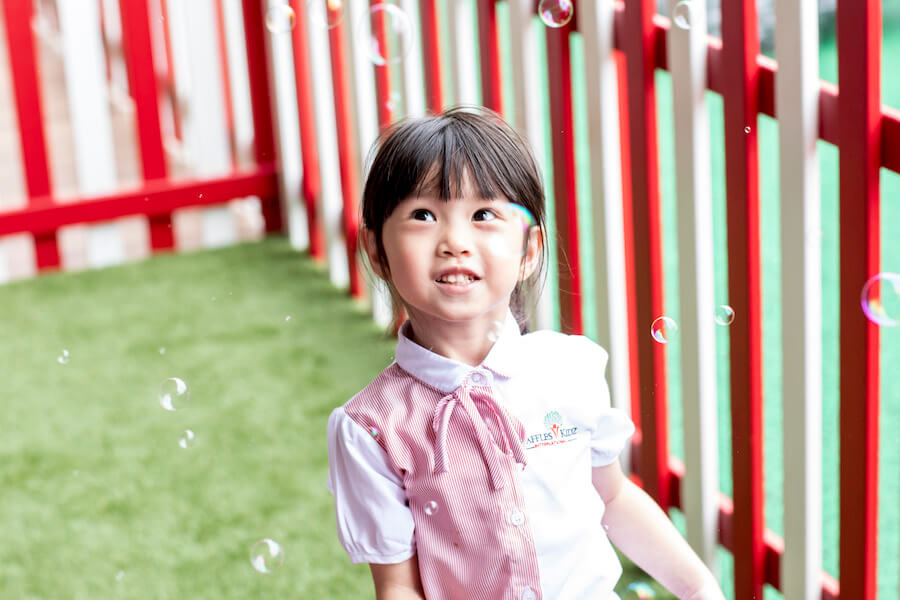Negative thoughts and emotions are an inevitable part of life. Research shows that people tend to dwell more on negative feelings than on positive ones, a principle that tends to apply to children as well. Negative emotions are usually fueled by fear, doubt, or shame, which triggers stress hormones in the body. As a result, negative attitudes shape how children see themselves and the world around them.
However, having negative thoughts is not necessarily “bad” or “wrong”. It’s vital to remember that all thoughts and emotions should be validated. For example, children would not know that they are doing something wrong without the feeling of guilt. A constant expectation of optimism and cheerfulness can lead children to feel burdened and negatively impact their development.
As such, it’s best to teach your children how to accept negative feelings and process them healthily. Encourage your child to develop a positive mindset by engaging in positive thinking and exercising positive affirmations. By having a balanced view of the world, children will gain more confidence in themselves and be more open to learning new things while improving themselves.
Here are some tips on how to promote having a positive mindset for your children:
1. Improve your child’s self-esteem
A positive mindset and a healthy sense of self are often intertwined. Allow your child to find new hobbies and interests, and visibly show pride in their success. For example, praising them when they complete a good drawing, or when they do chores around the house, shows them that you see their efforts and are proud of them. As they grow older, they will know that they have your support, which is a significant aspect of having enough self-confidence to have a positive mindset.
2. Set realistic goals for them
Goal-setting helps people become more confident and optimistic as they gain a sense of accomplishment whenever they achieve their goals. That feeling of accomplishment often inspires them to get more things done, creating a chain reaction of positive improvements. Set realistic goals for children by breaking down their big goals into smaller steps and allowing them to work their way through the steps to achieve them. While setting goals, encourage them to plan for potential setbacks as well. When your child experiences rejection or failure, explain to them how this could be a learning opportunity and help them understand that they can always get back up and try again. Resilience is an integral aspect of maintaining a positive mindset.
3. Teach them self-affirmations
Positive affirmations are statements your child must repeat to themselves to build on their self-esteem and to turn negative thoughts into positive ones. If your child is the one to come up with these statements, they are making themselves a part of the process and are taking the first step to internalising them.
These affirmations must be to the point, a positive statement, and in the present tense for it to work. You can help by showing them what they should sound like. For example, you can say, “I am smart”, “I am kind”, or “I am funny”. Remember not to force them to tell the affirmations. Instead, you could make these statements a part of their playtime or weave them into a song. This might take some consistent practice, but the results will be worth it when the affirmations become less like statements and more like facts. Slowly but surely, you will see a considerable improvement in their mindsets.
4. Sharing positivity at home
Parents and caregivers have the biggest influence on how their children perceive the world. Are you constantly bringing up all the bad things that happen to you at work instead of the good parts of your day? One of the most powerful ways to teach your child to have a positive attitude is to model this behaviour. Just like teaching them how to practice self-affirmations, taking your time to share positive experiences with your child not only deepens your bond with your child but also promotes positive thinking. Even when dealing with a negative situation, your positive way of handling the issue shows your child how to handle rejections and failure. When you accept and healthily process your emotions, you teach your child to do the same.
5. Encourage generous behaviour
When you encourage your child to be kind and learn how to share with others, not only does it benefit others around them, but it also brings out positive feelings in your child. Studies have shown that people who volunteer and perform other acts of charity have better self-esteem and are generally more secure with themselves.
This change is brought about because people tend to feel good about who they are when they help others. Children who consistently engage in such acts are also more likely to be optimistic as helping people can bring about a sense of community, appreciation for others, and happiness, which in turn, breeds positivity.
Conclusion
Positive thinking is a mindset that is best adopted at a young age. Raising your child with a positive mindset can dramatically affect their everyday lives. While you are practising these tips at home, let us take care of the rest. As a multi-award-winning childcare centre in Singapore that emphasises children’s holistic development, Raffles Kidz encourages children to develop positive and critical thinking through our comprehensive curriculum. Under the guidance of trained educators, children are taught how to handle their emotions and learn how to deal with different situations. Find out more about our holistic curriculum and nurturing environment and book a tour today!


